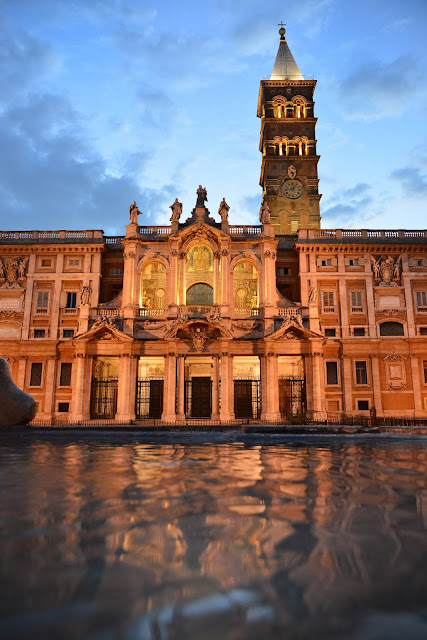Arriving at Piazza del Popolo for our day trip to Pompeii.
Our tour guide for the day at Pompeii and Mount Vesuvius.
A panoramic view of a courtyard and theatre in the background, all buried in 6m thick volcanic ashes in A.D.79.

The streets of Pompeii lined with shops and houses, once bustling with life more than one thousand nine hundred years ago.
Stone blocks protrude from the streets allowing pedestrians to cross the road during wet season. It also doubled up as Pompeii's drainage and sewage disposal system. The gaps between the blocks would still allow vehicles to pass through.
Some sort of restaurant once upon a time.
Beautiful interior courtyard of a house, many of which still intact with its decorative elements clearly visible.
A bed in a brothel in Pompeii.
One of the most famous body casts of the Pompeii tragedy - The Muleteer.
Some 1,150 bodies have been discovered.
The Forum with the respectable Vesuvius in the background.
Ascending Mount Vesuvius, one of the most dangerous volcanoes in the world.
Volcanic ash since its last eruption in 1944.
The fertile soil of Vesuvius giving life, with the scenic Gulf of Naples in the background.
A panoramic view of the path trekking up Vesuvius.
Presenting the crater of Vesuvius, after around 30-35mins of brisk uphill walk. Although at only 1,281m high, I was feeling quite nauseous due to the quick ascend. No, there wasn't any bubbling molten rock, fortunately.
Back to Rome and back to civilisation. Visited Zaha Hadid's creation - MAXXI (Museum of Arts of the XXI century).

Entering the atrium, the main elements are evident: concrete curved walls, suspended black staircases, open ceiling catching natural light. Zaha Hadid had intended 'a new fluid kind of spatiality of multiple perspective points and fragmented geometry, designed to embody the chaotic fluidity of modern life'.

A clever manipulation of artificial and natural light.
Staircases "flow" through the entire building.
Zaha's info counter.
The Basilica di Santa Maria Maggiore in the evening.
Revisiting the famous Pantheon, meaning temple of every god, built in 126 A.D.
Throughout the day, sunlight from the oculus moves around the interior space in a reverse sundial effect.
Buried beneath the grounds of Pantheon is one person we should not forget - Raphael, who died in 1520.
The grand interior of Pantheon. The height to the oculus and the diameter of the interior circle are exactly the same at 43.3m. The oculus also provides cooling and ventilation. On rainy days, rainwater descends into the interior and runs off into 22 tiny holes on the marble floor that connect to the old Roman underground drainpipes.
Corinthian column on the exterior of Pantheon.
Enjoying an ice cold Italian beer at Piazza della Rotonda, the plaza in front of the Pantheon. A perfect place to admire this magnificent Roman architecture.
Selfies at Piazza Navona.
One of the 3 fountains in Piazza Navona - Fontana del Moro (Moor Fountain).
Visited the Museo di Roma, an art museum housed in Palazzo Braschi, a massive and beautiful Neoclassical palace.
Inside the Palazzo Braschi palace.
The Piazza Navona blanketed with tourists.
Finally, what is Rome without the Colosseum.
More of Rome in my previous trip: http://aikkianphotography.blogspot.sg/2014/11/a-little-bit-of-europe.html#!/2014/11/a-little-bit-of-europe.html





































No comments:
Post a Comment